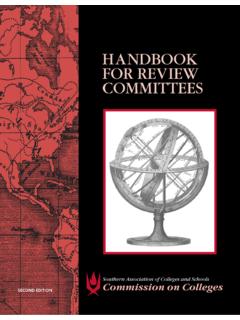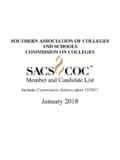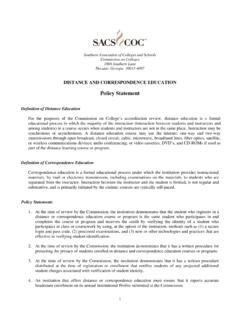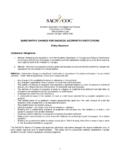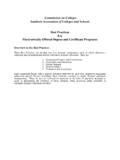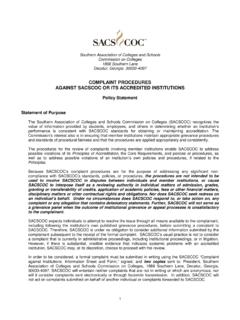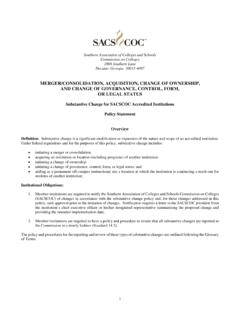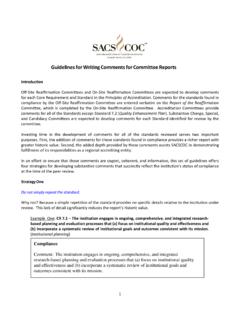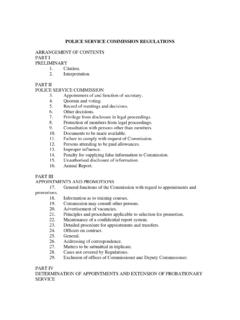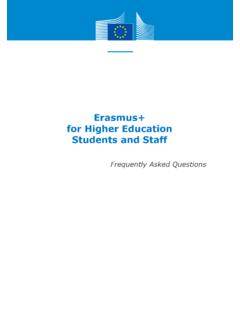Transcription of QEP Lead Evaluator - Commission on Colleges
1 1 Southern Association of Colleges and Schools Commission on Colleges 1866 Southern Lane Decatur, Georgia 30033-4097 THE QEP LEAD Evaluator : selection AND ROLE - Policy - Background Information The Southern Association of Colleges and Schools Commission on Colleges (SACSCOC), the regional body for the accreditation of degree-granting higher education institutions in the Southern states, requires its accredited institutions to undergo a comprehensive review every ten years to ensure that each institution continues to meet member-driven standards of quality. The comprehensive review includes the institutional submission of two documents: (1) a Compliance Certification and (2) a Quality Enhancement Plan (QEP).
2 The Compliance Certification is a document completed by the institution that demonstrates its judgment of the extent of its compliance with each of the Commission s standards: the Core Requirements, Comprehensive Standards, and Federal Requirements. This document is initially reviewed by the Off-Site Reaffirmation Committee. The Quality Enhancement Plan is a document developed by the institution that (1) includes a process identifying key issues emerging from institutional assessment, (2) focuses on learning outcomes and/or the environment supporting student learning and accomplishing the mission of the institution, (3) demonstrates institutional capability for the initiation, implementation, and completion of the QEP, (4) includes broad-based involvement of institutional constituencies in the development and proposed implementation of the QEP, and (5) identifies goals and a plan to assess their achievement.
3 This document is reviewed by the On-Site Reaffirmation Committee. The Quality Enhancement Plan (QEP) is an integral part of an institution s decennial reaffirmation of accreditation. In addition to making a persuasive argument that it continues to comply with all of the standards set forth in the Principles of Accreditation, the institution must also develop a plan to enhance the quality of its educational programs by focusing on an important aspect of student learning and/or the environment supporting that learning. Two of the standards Core Requirement and Comprehensive Standard present specific guidance as to the content and intent of the institution s QEP.
4 Policy Statement on the Nomination and selection of the QEP Lead Evaluator An institution conducting a review leading to reaffirmation of accreditation nominates candidates to serve on the On-Site Reaffirmation Committee as the lead Evaluator for the Quality Enhancement Plan (QEP). The Commission welcomes nominations from outside the Southern Association region. The Evaluator brings expertise in the general content area on which the QEP is focused and does not have to be employed by a college or university. In order to protect the integrity of the process and of the institution, the institution nominating the QEP lead Evaluator should be particularly sensitive to even the potential appearance of impropriety that could result from personal or professional relationships between the nominee and institutional personnel, 2either past or present.
5 Persons nominated should have special expertise in relation to the QEP and have no conflict of interest in connection with the evaluation. The conflict of interest policy of the Commission on Colleges applies to nominating the lead Evaluator for the QEP. (Access Ethical Obligations of Evaluators on the Commission s web site at , click onto policies.) A sitting COC Board of Trustee member may not serve on a reaffirmation committee scheduled to visit an institution that employs another sitting Board member. The institution may not call upon On-Site Reaffirmation Committee members, including the lead Evaluator for the QEP, for advice or consultation in relation to any follow-up responses or reports submitted by the institution until final positive action has been taken on reaffirmation of accreditation.
6 A committee member who violates this policy is removed from the Evaluator registry. The Commission expects an institution to respect the process by not engaging any team member as a consultant for this period of time. Institutions should submit the names and pertinent information for at least two persons to their Commission staff representative. When an institution submits nominations for the Evaluator , it provides the following information to the Commission staff for each nominee at least three months before the on-site reaffirmation visit: (1) Name and contact information (2) Title (3) Institution or organization (4) Experience and special expertise (5) Rationale for selection and explanation of how the nominee s expertise pertains to the QEP and its evaluation After the institution has confirmed the willingness of the Evaluator to serve on the committee, the Commission staff member invites the individual and includes a copy of the Commission s conflict of interest statement.
7 In a positive response to the staff member s invitation, the Evaluator indicates that the statement was reviewed and that no conflict of interest exists for the institutional assignment. Should the first nominee be unacceptable or decline the invitation, Commission staff will notify the institution that the second person on the list will be invited to allow the institution to make an initial contact with that person in advance of the invitation. The institution develops a series of questions or issues concerning the QEP that are forwarded to the staff of the Commission for review and then to the entire On-Site Reaffirmation Committee. The questions and issues focus on those particular areas for which the institution requests the advice of the Committee.
8 All of the issues and questions and suggested interviews should be sent to Commission staff and to the committee members at least six weeks in advance of the on-site visit Evaluators serving on On-Site Reaffirmation Committees receive the same nominal expense reimbursements from the Commission on Colleges ($100 plus expenses). Evaluators may not receive additional compensation from the institution or from other sources in connection with the evaluation. The Role of the QEP Lead Evaluator The On-Site Reaffirmation Committee reviews the institution s QEP. The QEP document along with the institution s Focused Report is sent to members of the On-Site Reaffirmation Committee approximately six weeks prior to the start of the visit.
9 Members of the Committee also receive companion materials from the Commission staff or Committee Chair setting out specific writing assignments related to remaining compliance concerns, US DOE standards needing further review, and the QEP. This preliminary material also includes a draft visit itinerary that provides a beginning structure for the visit itself. These writing assignments will often reflect the language of the two relevant standards (CR and CS ), with reviewers being assigned primary or secondary responsibilities for analysis and writing in six basic areas. Reviewers will read the document, conduct on-campus interviews with appropriate institutional constituencies, and engage in discussions with other committee members in order to answer the following questions: 3 Has the institution developed an acceptable Quality Enhancement Plan?
10 Did the institution engage in an institutional process that identified key issues emerging from institutional assessment in order to choose the focus of its plan? Does the QEP focus on learning outcomes and/or the environment supporting student learning? Has the institution demonstrated the institutional capability to initiate, implement, and complete the QEP? Does the QEP include broad-based involvement of constituencies in the development and proposed implementation of the plan? Does the QEP identify goals and a plan to assess their achievement? The review of the QEP is the responsibility of all members of the On-Site Reaffirmation Committee; any recommendations the Committee might propagate will result from consensus decisions of the Committee as a whole.
